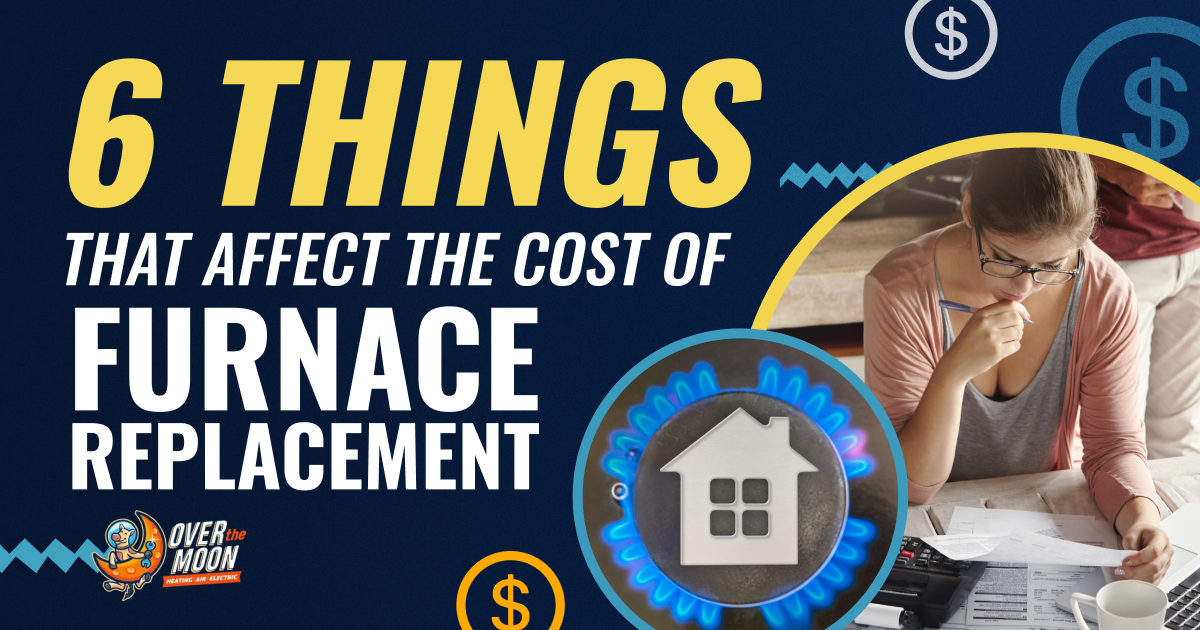The average cost of furnace replacement, according to HomeAdvisor, is over $4,700, but it can exceed $6,000 depending on where you live.1 Location is just one of the many factors that can affect the cost of the project. There are many other considerations that homeowners are often not familiar with. If you’re in the market for a furnace replacement, here are six other variables that can determine the total amount you’ll have to pay:
1. Furnace Type
Furnaces come in different types with different price ranges. The type of furnace you choose depends on the climate where you live and the heating needs of your home. Here are some examples of common furnace types and how they affect cost:
- Natural Gas Furnace ($3,800 to $10,000): However, expect to spend up to $12,000 for a newer, high-efficiency model. Natural gas furnaces are most effective in areas with cold, harsh winters as they tend to produce heat that feels warmer.1
- Oil Furnace ($6,750 to $10,000): Oil furnaces are common where oil is more widely available, like the Northeastern U.S. Unlike gas furnaces, they don’t carry the risk of explosions or carbon monoxide leaks. However, they’re less efficient and require more maintenance.1
- Electric Furnace ($1,600 to $6,900): Although efficient, electric furnaces use lots of electricity, so that’s a long-term cost consideration. But they effectively move air through heated coils and distribute it into ducts and throughout your home. An electric furnace is essentially a heat pump.1
2. Size of the Furnace
Furnace sizes are measured in British Thermal Units (BTUs). The amount of BTUs needed directly corresponds with the size of your home, so this is also a factor that affects the cost of furnace replacement. Furnace sizes typically range from 40,000 to 120,000 BTU. To determine how big a furnace you need, multiply your home’s square footage by 40 (however, you’ll need more BTUs if you live in a cold region). Here’s a look at furnace size vs. cost:
- 40,000 to 60,000 BTU: $2,000 to $3,000
- 80,000 to 100,000 BTU: $2,600 to $4,200
- 100,000 to 125,000 BTU: $3,000 to $4,500
- 125,000 to 150,000 BTU: $3,300 to $6,5001
The physical dimensions of a furnace also impact the price. The larger the unit, the more it will cost, but the best-suited size (as determined by a skilled technician) can save on energy and repair costs.
3. Energy Efficiency
The higher a furnace’s energy efficiency rating, the more it costs upfront. However, an older furnace may operate at just 70% efficiency. A furnace replacement with a 97% efficient unit gives you a 27% upgrade, and when you multiply that by your monthly energy bill, you can determine how much you’ll save. Therefore, if your heating bill is around $200, this increase in efficiency can save $54 on your utility bills each month.
4. Installation Costs
In some cases, the heating unit itself is just 50% of the installation cost. Labor can account for 20% to 30% of the project cost. Meanwhile, removing your old furnace plus acquiring a permit can amount to 15% to 25% of the total price. A permit fee, including the inspection price, can range from $400 to $1,500.1 Ask the contractor if removing your old unit is included in the cost, as doing so separately can be even more expensive. A furnace replacement contractor’s hourly rate can range from $50 to $100 plus up to $50 per hour per additional technician.1
5. Additional Improvements
When replacing your furnace, a reputable contractor will evaluate other aspects of your HVAC system and home. These can have a significant effect on the cost of replacing your furnace. Here are some examples:
- Venting: During furnace replacement, the venting system may need to be repaired, upgraded, or replaced. For example, if your last furnace vented into a chimney, you could update the system to vent pipes that run outside the house, which are more efficient. But the modifications will cost you.
- Ductwork: It’s a good idea to assess the condition of your ductwork. If it’s too small, leaking, or damaged, your new heating system won’t be efficient. Replacing ductwork can range from $1,500 to $7,000 based on the size of your home, duct accessibility, the number of vents, and the cost of wall materials (repairing ductwork generally costs $1,000 to $5,000).1
- Home Insulation and Sealing: Installing new insulation, weatherstripping, and even new windows are upfront investments but can save on heating costs over time. Often, weatherstripping or caulking can avoid having to replace windows.
6. Furnace Conversion
Converting from one furnace to another can significantly add to the cost of replacement. For example, converting from an electric to a gas furnace requires gas line installation, ductwork, and a return air stack, which can add $5,000 to $15,000. Converting from a heat pump to a gas furnace can cost up to $5,500 and replacing a boiler with a furnace can cost $2,000 to $6,000. Relocating a furnace can range from $1,000 to $20,000+.1
Call Over the Moon for a Furnace Replacement Quote
We understand how a broken furnace can make your home uncomfortable and unsafe. Our heating experts in Brookfield, WI, can repair your furnace when possible but will decide whether furnace replacement is the best option. If your furnace is old, needs frequent repairs, and your energy bills are skyrocketing, this makes financial sense. To request an in-home evaluation or quote and to discuss opportunities to save, contact us online or call (262) 320-3822.
Source: https://www.homeadvisor.com/cost/heating-and-cooling/install-a-furnace/

